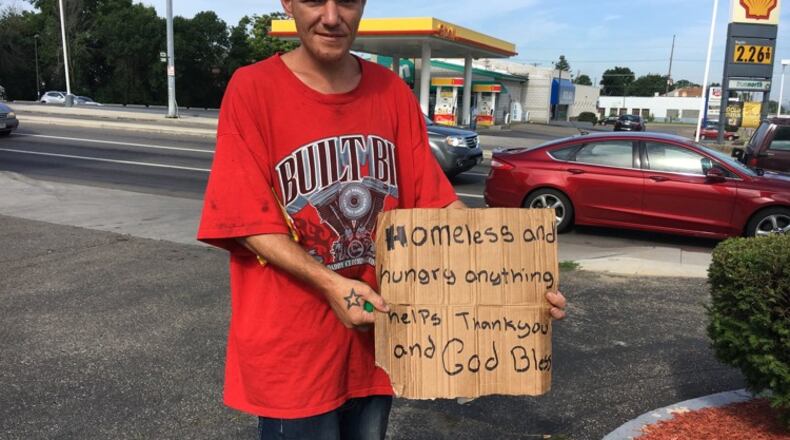“I think we need to make that a priority of policing,” she later told this newspaper.
RELATED: Reporter | 7 things I learned hanging out with Dayton panhandlers
The city of Dayton repealed some its solicitation ordinances last year because they were likely unconstitutional.
Anti-panhandling laws across the country have been struck down or rescinded because federal courts and the U.S. Supreme Court have ruled that begging and asking for donations or help is protected free speech.
Though a nuisance, panhandling cannot be banned under First Amendment protections, city officials said.
But last year, the city passed new regulations on distribution, which is the act of giving or taking money or other items.
In Dayton, distribution activities are restricted in the right-of-way because it is a safety concern for pedestrians and motorists, officials said.
Panhandlers can only engage in distribution when a vehicle is stopped at a traffic light if the panhandler remains on the sidewalk or unpaved shoulder of the road. Panhandlers cannot be on a the median or traffic islands.
Also, panhandlers are prohibited from touching or grabbing people without their consent or following or continuing to ask for money or other items if a citizen has clearly said they do not want to donate.
Dayton authorities charged just four people with distribution violations in the third quarter of this year, compared to 11 cases in the previous quarter and 22 in Q1, according to the city law department.
RELATED: Beggars brace as city says ‘it’s OK to say no’ to them
Whaley said she regularly sees panhandlers illegally enter the right-of-way to collect cash from motorists.
“They get in the road every time — it’s dangerous, it’s not good for our quality of life and it needs to be enforced,” she said.
Dayton’s new distribution laws are more difficult to enforce than the previous panhandling ordinances, Whaley said, but police must prioritize this enforcement because it is frustrating many citizens and harming perceptions of the city.
The bulk of the city’s distribution cases have been generated by one Dayton police officer, who is out on medical leave, which may explain the decrease in charges in the most recent quarter, officials said.
Whaley said other officers should make distribution enforcement a prime concern.
The legal changes have been somewhat confusing and complex, and some police officers have received guidance from the law department to better understand what now constitutes a violation of the distribution laws, said Stephanie Cook, Dayton’s chief prosecutor.
Aggressive distribution and distribution in a right-of-way are both fourth-degree misdemeanors.
Dayton residents are generous and want to be charitable, but giving money to panhandlers is a poor decision, according to city and business leaders.
They urge citizens to redirect those dollars to charitable organizations that feed, house or otherwise serve the homeless and needy.
Panhandlers are not necessarily homeless, local officials and residents say, and some fake the extent of their poverty or are members of organized panhandling rings.
Local partners started the Real Change Dayton campaign, which has installed red, retired parking meters across the city to accept donations for nonprofit and social service agencies.
The meters, along with a related texting campaign, encourages citizens to donate in more meaningful ways that do not encourage nuisance begging, officials said.
About the Author

